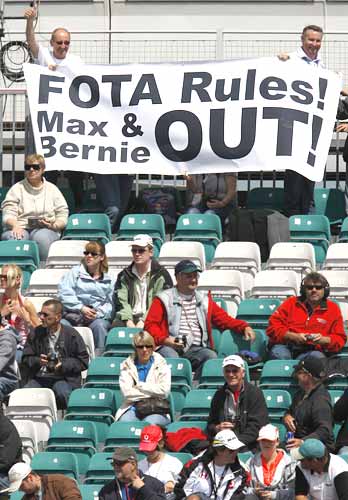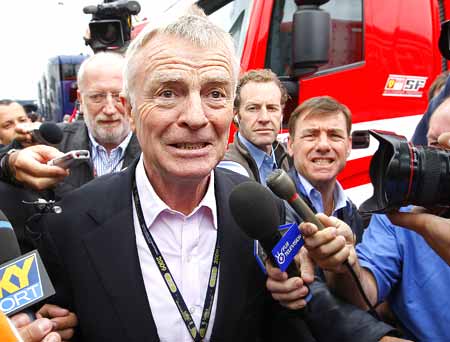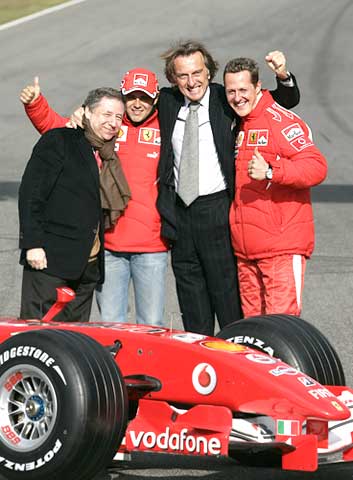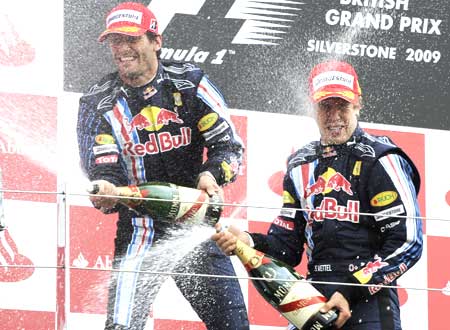
So Formula One died and was resurrected, all in the last ten days.
In a nutshell: The FIA, the body which governs F1, was waging war with the FOTA, the teams that race in F1, over rules and regulations for the 2010 season and beyond. The teams threatened to walk away and start their own series, and they almost did.
Here's a quick FAQ to give you a basic idea of what went down:
Q: What was the big disagreement about?
A: Well, the FIA wanted to give the teams a budget-cap of 40 million pounds, and then say make a two-tier system giving teams which operated within the budget a different set of rules as opposed to the teams going over the budget cap.
The teams felt this was unfair, that there should be one set of rules for all teams and that the budget cap should be more realistic in numbers, since a lot of the bigger teams spend over 200 million pounds now, and the workforce redundancies a budget cap like the FIA suggested would be lethal.
Q: Why did the FIA have to reduce costs? Can't teams spend as much as they like?
A: The FIA felt that the recession had to be factored into the equation and that the budget cap would allow for newer teams to enter the fray. Teams like Renault were adamantly opposed to a two-tier system since they have all grown slowly from fledgling teams into big ones and have always had to play with the same rules as the big boys.
The F1 teams aren't opposed to a realistic budget cap, but say this is a debatable figure that should be arrived at gradually, not in one shot. Also, F1 is about absolute excellence in racing and has always pushed technical boundaries, which is why crippling it by introducing a budget cap for the entire team that is marginally above Kimi Raikkonen's salary is a laughable way to go about things.
Q. Who is Max Mosley, and why has he been fighting Ferrari?
A: Max Mosley is the President of the FIA, and he's been criticised by the F1 teams for being dictatorial. The big fight has been between the FIA and Ferrari since the oldest team in the sport had an official veto power against any FIA regulation change and Mosley pushed in the 2010 rules without letting Ferrari exercise its power.
The battle has been on since then between Max Mosley and Ferrari bossman Luca Di Montezomolo.
Q. So which is bigger, Ferrari or Formula One?
A: No team is bigger than the sport -- or is it? As Ferrari threatened to walk out of F1, almost every team in the sport stuck shoulders behind the decision including rivals McLaren and Renault. Fans around the world said they would not watch F1 without Ferrari in it, and the call became too great to ignore.
If Ferrari would not participate it would still surely be F1, but the sport would lose its edge, a fact drivers and constructors unanimously opined. Polls across motorsport fanbases echoed that they would rather watch a Ferrari-involved breakaway series than F1 without the top team.
Q. So who was the first to back down?
A: Well, legal threats were made as Ferrari took top teams with it to go form a breakaway series and create a new spectacle for the people, and F1 was aghast as every driver swore to follow its team rather than stay in a decapitated Formula One.
Finally the FOTA officially announced their breakaway series, with new teams as well as reduced ticket prices, and promising far greater spectacle. F1 was very close to being written off, when Montezomolo flew into Paris for an extraordinary meeting of the World Motor Sports Council and executed the perfect kiss of death.
Q. Which means what? Who died and who lives?
A: Basically the FIA forced Max Mosley to step down. Mosley will not be standing for reelection this October, and the teams have won and the rules for 2010 will stay the exact same as this year's rules, while the FOTA has sworn to get back to a 90s level of spending within the next couple of years. There are no fixed number-based commitments, however.
There is still much friction between Mosley and the FOTA and the press mudslinging continues, but the battle is sorted and F1 will continue as it is, with three new teams joining the fray.
Q. Haven't the ongoing engine-freeze and the rules for 2009 ensured a completely mad season so far with all the top teams and drivers languishing around the middle and back of the grid? Will things stay the same in 2010?
A: Hopefully not. Last year's rule changes were a dramatic shift and teams like Brawn GP and Red Bull interpreted the rules in the optimum way, but as we can see, other teams are already catching them up. Next year should bring a lot more of a level playing field, but it's interesting that Brawn and Red Bull are now teams that will definitely be at or near the front of the field, at least for the foreseeable future.